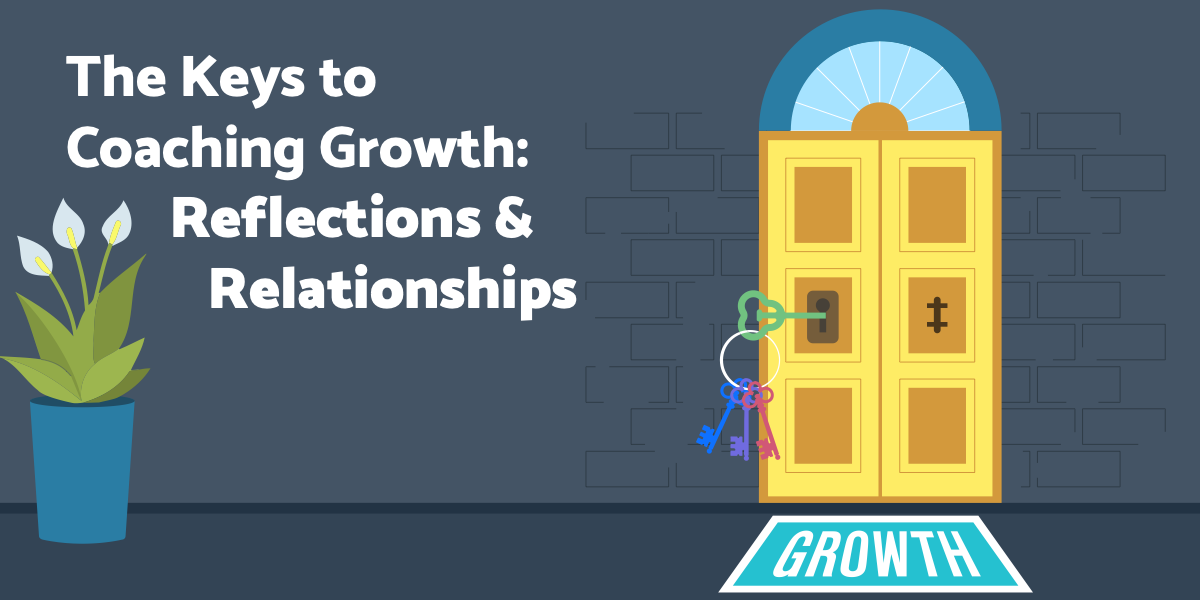


Rachel Mane, secondary math specialist in Texas, highlights what she believes to be the two most significant factors to her coaching growth and journey: relationships and reflection.
T
he pandemic altered my role as a coach—as it did for so many others—by pushing me to build and maintain coaching relationships in a virtual environment. But, it also provided me with a new perspective and the opportunity to reflect on how my coaching has developed since I became an IC two and a half years ago.
Over this time, I have attended coaching conferences and academies from Joellen Killion to Diane Sweeney and Jim Knight; even though their focus might be slightly different, they are all centered on the importance of relationships. Further, Steve Barkley’s podcasts, Michael Bungay Stanier’s written resources, and the weekly #educoach Twitter chat all reinforce the need for strong and lasting relationships, often based on questioning. Listening to all these experts shaped my work as a coach by helping me reflect, reconsider, and grow. I’d like to share below with my fellow ICs my journey through relationships and reflections.
A focus on relationships
At the beginning of my coaching career, I was nervous to begin a relationship and often remained very quiet and almost unsure of what to say and when. Thanks to the time spent attending conferences and engaging with coaching resources, I can say that today I’m much more confident in my conversations and utilize questioning to help build strong relationships. I find balancing personal and professional conversations opens the door for more relationships to begin since you show you care about the person and their life beyond the classroom.
It’s also important to recognize that, while there are many lasting relationships to celebrate, not all relationships can be a success story—at least not yet. I’ve encountered some people who are resistant or hesitant to change, others with “no time” to meet or converse, and those that I just can’t seem to connect with. I am grateful that I’ve had time to reflect, enhance my coaching, and plan to return to these yet-to-form relationships with a new perspective.
Taking time to reflect
At this stage in my coaching career, I find myself reflecting after each conversation, co-teaching opportunity, email, and coaching session. Reflection has become such an essential part of my work as a coach and helped me grow the most. I keep a notebook where I write down thoughts as they occur in-the-moment that I want to remember in the future. I also make sure I reflect after each event or activity and record these reflections in my notebook as well. Writing down my thoughts solidifies my ideas and helps me remember to carry them forward. When I first began coaching, I didn’t do this until a colleague shared this tip with me—I’m now so thankful to have adopted this practice.
Reflection is also the center of each conversation I have with teachers, even if it is not explicit that we are taking time to reflect. Questioning teachers in a way that encourages reflection is important to keep coaching conversations as an open dialogue. Jim Knight and Michael Bungay Stanier have inspired me to use some engaging reflection questions in my dialogue with teachers:
- “What’s on your mind?”
- “What does that look like or sound like to you?”
- “And what else?”
Each of these questions allows teachers to express their thinking, share their feelings, and steer the conversation in the direction of their choosing. It also tells me, as the coach, what is important to them or pressing to discuss.
Final note
Each school year, I take the time to think back on all that I have accomplished throughout the year and thank each teacher I had the opportunity to work alongside. I am always focused on learning and growing in my role and am grateful to have a team to learn from. I look forward to learning more about relationships and the power of reflection and would love to hear your thoughts on reflection techniques. Please share them below!
About our Guest Blogger
Rachel Mane is a secondary math specialist in the North East Independent School District located in San Antonio Texas. She supports both Middle and High School instructional coaches and teachers. Rachel also supports district curriculum and designs professional development.
Rachel has been in education for over 10 years, with teaching experience in multiple states and grade levels. Outside of her organization, she has presented nationally on Gamification in Secondary Mathematics.
Be sure to follow Rachel on Twitter @manelymath!
{{cta(‘352a410e-db79-4f33-a482-d301e8041965′,’justifycenter’)}}
Stay Connected
News, articles, and tips for meeting your district’s goals—delivered to your inbox.








